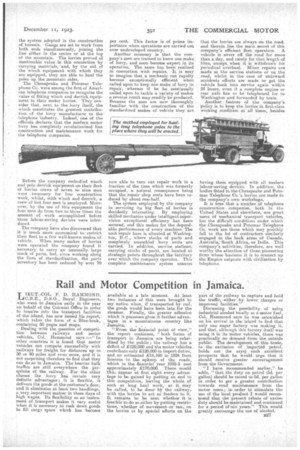Rail and Motor Competition in Jamaica.
Page 11

If you've noticed an error in this article please click here to report it so we can fix it.
LIEUT.-COL. F. D. HAMMOND, C,B.E., D.S.O., Royal Engineers, who went, to Jamaica early in the year on behalf of the Colonial Office in order to inquire into the transport facilities of the island, has now issued his report, which takes the form of a Blue-book, containing 58 pages and maps. Dealing with the question of competition between railways and motor vehicles, Col. Hammond says :—" In other countries it is found that motor vehicles can compete successfully with railways for freight for distances up to 50 or 40 miles and even more, and it is not surprising therefore to find that they can do so in Jamaica. The heavier bulk traffics are still everywhere the perquisite of the railway. For the other classes the lorry has certain very definite advantages; it is flexible, it delivers the goods at the customer's door, and it eliminates at least two handlings, 0 very important matter in these days of high wages. Its flexibility as an instrument of transport makes it very useful when it is necessary to rush down goods to fill cargo space which has become
available at a late moment. At' least two instances of this were brought to my notice when, if transported by rail, the goods would have been late for the steamer. Finally, the greater adhesion which it possesses gives it further advantages in a 'mountainous country like Jamaica. . .
"From the financial point of view," the report continues, " both forms of transport in Jamaica are being subsidized by the public ; the railway has a deficit of £120,000 and the motor vehicles contribute only 2120,000 in import duties, and an estimated £16,100 in 1924 from licences to the upkeep of the roads, which in the financial year 1922-3 cost approximately R170,000. There would thir, appear at first sight every advantage to be gained by putting an end to this competition, leaving the whole of such as long haul work, as it. may be called, to be done137 the railway, with the lorries to act as feeders to it. It remains to be seen whether it is feasible to do so either by-putting restrictions, whether of movement or tax,, on the lorries or by special efforts on the
part of the railway to capture and hold the traffic, either by lower charges or improved facilities.
Discussing the possibility of using industrial alcohol locally as a motor fuel, Col. Hammond says he was astonished on his arrival in die island to find that only one sugar factory was making it, and that, although this factory itself was using it in its motor vehicles, there was practically no demand from the outside public. The development of this trade, to the exclusion of imported petrol, holds out (he says) such excellent prospects that he would. urge that it should receive greater encouragement from the Government.
"I have recommended earlier," he adds, " that the duty on petrol (5d, per gallon) should be raised to 8d. per gallon in order to get a greater contribution towards road maintenance from the motor users; in order to stimulate the use of the local product I would recommend that the present rebate of excise duty should be maintained and continued for a period of 'six years." This would greatly encourage the use of alcohol.
































